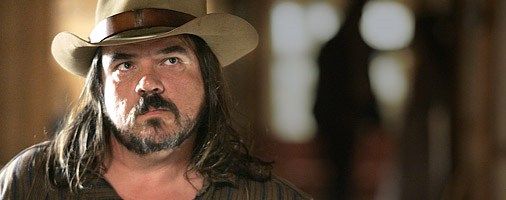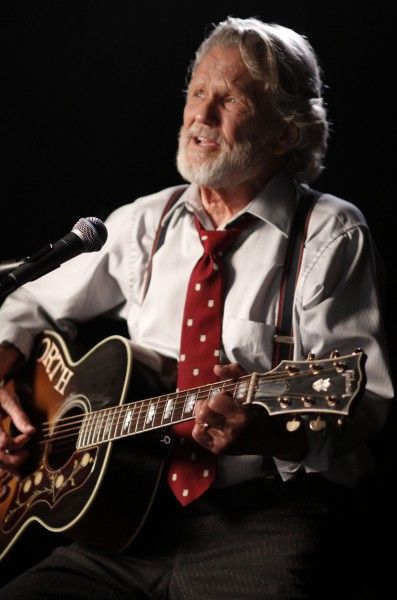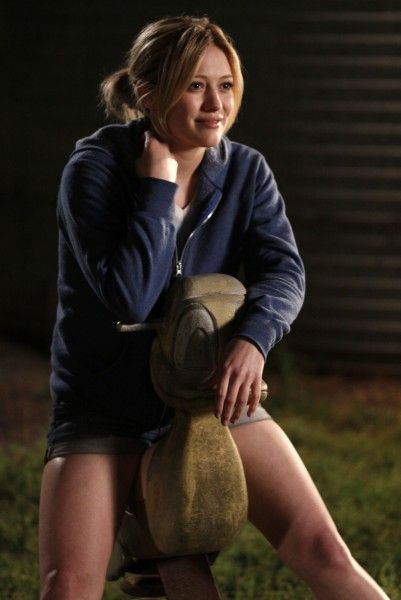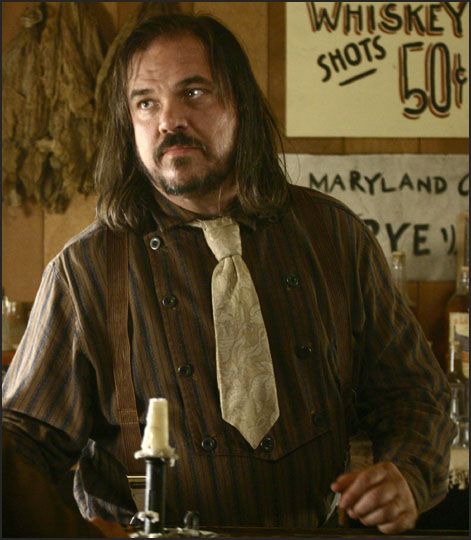In the independent drama Bloodworth, E.F. Bloodworth (Kris Kristofferson) returns home to Tennessee to find the wife he walked out on (Frances Conroy) withered and faded, and his three sons – Warren (Val Kilmer), Boyd (Dwight Yoakam) and Brady (W. Earl Brown) – grown and soured by years of anger. Only Fleming (Reece Thompson), the old man’s grandson, treats him with the respect his age commands, and sees past all the hatred to realize the way it can poison a man’s soul.
At the film’s press day, actor/screenwriter/producer W. Earl Brown talked about the roller coaster of getting financing for the film, having Kris Kristofferson sign on for the lead role, getting to meet one of his heroes and having it live up to the expectation, and how cathartic it can be to play a character that was so angry. He also talked about what he learned on his time from Deadwood, working with David Milch, the role he plays in the upcoming HBO series Luck, and his next writing project, a thriller called Reverse Course. Check out what he had to say after the jump:
Question: What was the roller coaster of financing this like?
W. EARL BROWN: It was an E-ticket ride, man. Everything was moth-balled from our first go-around in 2006. It was a house of cards. When one card tumbled, unfortunately, it was at the bottom, so we moth-balled everything from that time. We had props and set dressings that were stored away, that we were able to use later, but we started all over. We went out to financiers and people with money and let them read the script, and then pitched the story. By 7 o’clock at night, that first day of filming, we had everything closed, but we started the first day of shooting without things closed. We had X amount of money, but we knew we had to get the other money to get it finished.
Did bringing in Kris Kristofferson help you get the financing?
BROWN: Kris’ attachment didn’t really help, in the beginning. It helped us with getting T-Bone [Burnett] on board, and it got Dwight [Yoakam] and Val [Kilmer] on board. We wanted Kris, from the beginning. The impetus of ever making this into a film was an interview I read with Johnny Cash. My wife was reading Nashville Living magazine and I saw a review of the novel, which was two years old, at that point. I had already read it and loved the book. The interviewer asked Johnny, “Is there anything you have left to do in life?,” and his answer was, “If my health holds up, I’d like to do one more movie.” So, that was the idea, but Johnny’s health was way worse than anyone knew.
Kris was always our choice. Kris is the greatest musician to become an actor. He’s a great actor, and you can look at how many great films he’s made, over the years. For the first go-around in 2006, that’s who we wanted, but This Old Road was coming out – his record on New West – and he had a year of concerts booked, so he wasn’t doing any films. But then, the way things played into our hands was that, after we had moth-balled everything, in the interim, Kris read it. His daughter had read it first, and she recommended it. When he read it, his agent called our casting director and said, “Whatever happened to this movie, Kris wants to do it.” So, we went from actively pursuing him to, a few years later, having them be interested in doing it with us. I remember vividly, as a kid, my mother had Jesus Was a Capricorn and used to listen to it over and over and over. And then, in the days before videotape, my sister went to see A Star is Born seven times in the movie theater. He was one of my heroes, and still is, except now I know him.
What was it like to actually meet him?
BROWN: I’m very wary of fawning too much over heroes. There’s an old adage that heroes are best kept at arm’s length, and in a few instances in my life, that’s been true. But, Kris would be the opposite of that. I had read the Shel Silverstein biography, A Boy Named Shel, and I had it with me. I read a lot, and I had it in my apartment. The first time he was in my apartment, he saw the book. I didn’t realize how much the two of them had worked together until I read it. They wrote several songs together, including “The Taker,” which was a huge hit of Waylon [Jennings]. So, he started regaling me with these stories of working with Shel. We had shot one day, so I had met him on the set.
And then, that night, I was in my apartment, just trying to go to sleep. I was watching TV with no pants on, and there was a knock on the door. I was like, “What in the hell does anybody need at this hour?” I padded to the door and opened it, and it was Kris. He said, “Hey, man, you want to go out for one, two or three?,” and I was like, “Let me get some pants on.” There was a place called The Blue Post nearby that had a great jukebox, so that’s where we’d go hang out. Reece [Thompson], who didn’t really know of Kris until we started doing the film, just became enamored of him. We were out one night and I was playing “Leopard-Skin Pill-Box Hat” on the jukebox, and Kris was telling the story about being the janitor at Columbia in Nashville when Bob recorded the record. He said that no musicians or songwriters were allowed except for him because he was emptying his ashtrays. He said, “I vividly remember him sitting under the piano. He’d sit there with his notebook and, every now and then, he’d reach up above himself and ping out some notes, and then go back to his notebook.” So, while he was telling us this story, me, being a music freak, I was just eating it up.
And then, this 20-year-old college girl comes over and says, “I hate to bother you, but could I get your autograph?” He was like, “Yeah, sure.” So, he was signing the autograph and she said, “I love you! The Blade movies are my favorite movies, ever. I just love those films!” And, Reece said, “Well, why don’t you go play him on the jukebox?” And she said, “You’re a songwriter?” She had no clue! Whatever “it” is, he’s got a triple scoop. Women from 20 to 70 just love him. But, he doesn’t think of himself that way, at all, which makes him all the cooler. He’s very humble and very down-to-earth. He was a road scholar, and then he went and flew choppers in Vietnam. When he got out of the Army, he said that all he dreamt of was being a songwriter, so he left everything and went to Nashville, and Cowboy Jack Clement met him and gave him a job as a janitor at Columbia.
What was Hilary Duff like?
BROWN: I didn’t know what to expect. You read all the tabloid stuff of the teenage girl stars, and I expected an entourage of some sort, but not at all, literally or figuratively. She showed up by herself, with her suitcase and ready to work. I know Sheila [Kelley]. I worked with her, years ago, and knew that she was a phenomenal actress. I got to know her on Dancing at the Blue Iguana. In 1996, the two of us did a version of A Streetcar Named Desire, where I was Mitch and she was Blanche, but it all fell apart. We struck up a friendship from that, and then we did Blue Iguana.
Your character had so much anger that he was holding onto. Is it hard to play that, as an actor?
BROWN: It depends. I lived with this story so much, for so many years, that I knew it backwards and forwards. It was actually kind of an exorcism because of the stress that we were under to get the movie made. To make a low-budget independent is not easy work. We were under months of a heavy load on our backs, so Brady was an exorcism of all of that angst and stress. Now, the leg brace and the physical part threw me out. My back was messed up. Sometimes, I have played something that psychologically sticks with me, that’s opposite of where I am. I guess I have a lot of anger in me.
What did you learn from your time on Deadwood, working with David Milch, that you feel strengthened you, as an actor and as a writer?
BROWN: I’ve had a few mentors in my life. When you get out of college, you think, “I’ve learned all I need to learn.” Well, that wasn’t the case with David. You’d pitch him story ideas and he’d say, “Yeah, I like that. Go write three scenes and develop and arc.” So then, you’d go do it and come back, and sometimes he wouldn’t like it and sometimes he would, and then he’s rewrite everyone. I would be like, “Oh, this is a great story idea!,” and then he would take it and turn it 180 degrees, and it would be so much more interesting. I love David. Anything he asks me to do, I’ll be there to do it. I learned a lot from him. I got lucky in that twice I got one-on-one lectures from him, sitting in his trailer for a couple of hours, talking about his theory of writing. He was encouraging, in that he said, “It’s obvious that you have an ability to tell stories. As an actor, you are here in service to the story that is coming through the writer. Stories have a way of telling themselves. You just have to set your ego aside and listen.” I told my wife once, “I feel like I’m getting paid to sit at the feet of Aristotle.” Some people are like, “You’re comparing David Milch to Aristotle,” and yeah, I am, but I’m not Plato.
Are you working with him on Luck (the HBO series about horse racing)?
BROWN: As an actor, I did a couple of episodes. I play Chris Mulligan. He’s a trainer. He’s based on a real guy. There’s a continuation of the arc, but we didn’t get to it this season. There’s a slim chance that there might be more Deadwood, or at least a film to wrap it up. That might happen. He wants to, and everybody wants to. It’s a matter of scheduling and trying to get everybody. Hopefully, someday, that will happen. Top to bottom, every actor on that show was extraordinary. Every writer that was working with him was extraordinary. I miss them all. I’m doing a movie with [John] Hawkes right now, as an actor, and when we get together, there’s that comradery that time has not eroded. We didn’t get branded, but we got close. We almost got identical tattoos.
Do you know what you’re going to do next, writing wise?
BROWN: [Shane Dax Taylor and I] came up with this idea for this white water, kayaking, repelling thriller with four guys who get together for their yearly trip and one of the guys dies. We start at the funeral and work our way back to when they leave for that trip. It’s called Reverse Course. [Harold] Pinter’s Betrayal was my template for that. The idea is that it’s a thriller where you know what happens, but you don’t know how and why. Every time the linear narrative breaks, the audience’s perception of how they think something happened or why it happened changes. We’re casting right now, and hopefully we’ll start shooting in late June.




